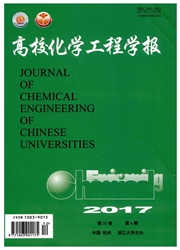

 中文摘要:
中文摘要:
高活性的木瓜蛋白酶有助于降低其在食品和医药工业中的应用成本。研究了超声波对木瓜蛋白酶活性的影响,并从动力学和热力学参数的变化分析了酶活性变化机理。结果表明,超声波对木瓜蛋白酶活性的影响较显著,在超声波功率40 W处理5 min时,木瓜蛋白酶活性提高最大,比对照组提高了9.0%,随着处理时间的延长,木瓜蛋白酶活性开始下降,9 min时酶活性比对照组降低了14.5%。当超声处理温度从20℃增加到40℃时,木瓜蛋白酶的反应速率常数从0.0628增加到0.0753。而热力学参数Ea、△H、△S和△G经过超声波处理后分别降低了14.9%、16.2%、7.3%和0.1%。由动力学和热力学参数的变化可见,木瓜蛋白酶经过一定功率的超声处理一定时间后,其催化的反应更容易进行。
 英文摘要:
英文摘要:
The higher activity of papain can reduce significantly its application cost in food and medicine industry. So, the effect of ultrasound on the activity of papain was explored in this paper. The results show that ultrasound has significant effect on the activity ofpapain. The mechanism was elucidated through variations of kinetics and thermodynamics parameters of the papain using enzymolysis. When the sample was treated with ultrasound at 40 W for 5 min, the highest papain activity was achieved, which is increased by 9.0% over the control. After 5 min, the activity of papain decreases gradually with the increase of ultrasonic time, and the enzyme activity is decreased by 14.5% as compared with that of the control after 9 min. The reaction rate constant increases from 0.0628 to 0.0753 when the ultrasonic temperature increases from 20℃ to 40℃. After ultrasonic treatment, the thermodynamic parameters of the enzymolysis, Ea, △H, △S and △G, are reduced by 14.9%, 16.2%, 7.3%, and 0.1%, respectively. From the variations of kinetics and thermodynamics parameters, it can be concluded that the treatments of papain by ultrasound at certain power and time will make the reaction catalyzed by papain easier.
 同期刊论文项目
同期刊论文项目
 同项目期刊论文
同项目期刊论文
 Pretreatment of defatted wheat germ proteins (by-products of flour mill industry) using ultrasonic h
Pretreatment of defatted wheat germ proteins (by-products of flour mill industry) using ultrasonic h Enzymolysis kinetics and activities of ACE inhibitory peptides from wheat germ protein prepared with
Enzymolysis kinetics and activities of ACE inhibitory peptides from wheat germ protein prepared with Combined effect of ultrasound and enzymatic treatments on production of ace inhibitory peptides from
Combined effect of ultrasound and enzymatic treatments on production of ace inhibitory peptides from Effects of sweeping frequency ultrasound treatment on enzymatic preparations of ACE?inhibitory pepti
Effects of sweeping frequency ultrasound treatment on enzymatic preparations of ACE?inhibitory pepti Ultrasonic pretreatment of corn gluten meal proteins andneutrase: Effect on protein conformation and
Ultrasonic pretreatment of corn gluten meal proteins andneutrase: Effect on protein conformation and Optimization of Process Conditions for Production of Angiotensin-I Converting Enzyme (ACE) Inhibitor
Optimization of Process Conditions for Production of Angiotensin-I Converting Enzyme (ACE) Inhibitor 期刊信息
期刊信息
